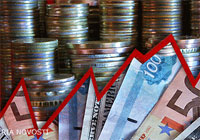Interfax: WTO will remain, but still no progress seen in talks – Russian minister

BALI. Dec 3 (Interfax) – The ninth WTO ministerial conference in Bali will not resolve all the problems of the Doha Round, but even if it ends in failure the World Trade Organization “will not disappear – if only because there is no alternative to it,” Russian Economic Development Minister Alexei Ulyukayev said in an interview with Interfax before the start of the conference.
“In general it’s still not possible to talk about progress in Doha Round negotiations [that began within the WTO in 2001]. Its future has not yet been determined due to ongoing differences between members of the organization on the pace and conditions for liberalizing global trade. Therefore, at best we can reach an agreement on the conditions for approving a so-called Bali package – agreements concerning the simplification of trade procedures, agriculture and aid to developing countries. We believe that they are all at a very high degree of readiness, but success depends on whether we get a consensus decision by all ministers,” Ulyukayev said.
The “Bali package is good for the Russian economy,” he said. “Experts expect a substantial improvement in the conditions of access to certain markets just from the application of the agreement on simplifying trade procedures,” Ulyukayev said.
In some countries, for example, customs processing procedures take up to three months, he said. “[In Russia], as a rule, [it takes] a day, in rare cases more. If there is an agreement, administrative barriers for our exporters will decrease on many markets,” the minister said.
The agreements on agriculture, he said, call for increasing the transparency of tariff quota mechanisms. “We have growing interest in the development of the export programs of agribusinesses, but many markets are closed by quotas, and they are administered, let’s say, not always comprehensibly for vendors. As in the case with customs processing, the Russian system for managing quotas is far clearer, more open. We don’t have to change it much, but many of our partners will have to do this,” Ulyukayev said.
Agreements on export subsidies in agriculture, he said, affirm the intentions of WTO members to abandon them in future. “Russia does not use such subsidies, which means we will benefit here too,” the minister said.
He did not venture to forecast whether “we’ll be able to reach an agreement or not.”
“Dozens of countries, including Russia, appealed to the WTO director general a few days ago with, let’s say, an insistent proposal to conclude negotiations on the drafts of all agreements in Bali. We intend to work day and night so that this goal is achieved. These will be hot days in any case,” Ulyukayev said.
“Countries will always trade with one another and they need a regulator and judge. The failure of negotiations in Bali will mean that the WTO cannot work out new trade rules. But the existing ones will still be applied. For the current structure of our economy, they are in principle sufficient. But not for the one we want to see in 15 years,” Ulyukayev said.
